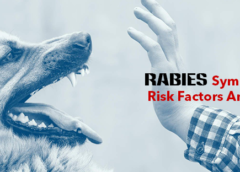Overview
Rabies is a deadly virus transmitted from the saliva of infected animals to humans. The rabies virus is usually transmitted by a bite.
In the United States, species most likely to spread rabies include bats, coyotes, foxes, raccoons, and skunks. Stray dogs are the most likely to transmit rabies to people in developing countries of Africa and South-East Asia.
When a person begins to show signs and symptoms of rabies, the disease almost always causes death. This is why someone at risk of rabies would seek rabies vaccinations for safety.
Symptoms of Rabies
The first rabies signs can be very like flu, which can last for days.
Later signs and symptoms can include:x
- Fever
- Headache
- Nausea
- Vomiting
- Agitation
- Anxiety
- Confusion
- Hyperactivity
- Swallowing difficulty
- Excessive salivation
- Pain caused by attempts to drink fluids due to water swallowing difficulties
- Hallucinations
- Insomnia
- Partial paralysis
When to see a doctor
If you are bitten by any animal or exposed to an animal suspected of having rabies, seek urgent medical attention. Based on your injuries and the condition in which the exposure happened, you and your doctor can determine whether you should seek rabies preventive care.
And if you’re not sure whether you were bitten, seek medical attention. For example, a bat that flies into your room when you’re sleeping can bite you without waking you. If you wake up to find a bat in your room, assume you were bitten. Also, if you see a bat near a person who can’t disclose a bite, such as a small child or a disabled person, presume that person was bitten.
Causes
The rabies virus is responsible for the rabies infection. The virus is spread by contaminated animal saliva. Infected animals may likely spread the virus by biting another animal or human.
Rabies may be spread in rare cases when contaminated saliva reaches an open wound or mucous membranes, such as the mouth or eyes. It could happen if an infected animal licked up an open cut on your face.
Animals that can spread the rabies virus
The rabies virus can be transmitted by any mammal (an animal that sucks its young ones). Animals which are most likely to spread the rabies virus to humans include:
Pets and farm animals
- Cats
- Cows
- Dogs
- Ferrets
- Goats
- Horses
Wild animals
- Bats
- Beavers
- Coyotes
- Foxes
- Monkeys
- Raccoons
- Skunks
- Woodchucks
The virus was spread from an infected organ to recipients of tissue and organ transplants, in rare cases.
Risk factors
Factors which could increase the risk of rabies include:
- Traveling or living in developing countries with a higher prevalence of rabies, including countries in Africa and Southeast Asia
- Activities which could bring you in contact with wild animals that may have rabies, like exploring caves where bats live or camping without taking precautions to keep animal far from your campsite
- Working in the rabies virus laboratory
- Head and neck wounds that can help the rabies virus spread faster to the brain
Prevention
To minimize the risk of coming into contact with rabid animals:
Vaccinate the pets: Cats, dogs and ferrets may be vaccinated against rabies. Ask your veterinarian how much vaccines should be made on your pets.
Keep the pets confined: Hold your pets indoors and track them outdoors. It will help protect your pets from touching wild animals.
Protect small pets from predators: Keep indoors or in enclosed cages rabbits and other small pets, such as guinea pigs, so they are free from wild animals. These tiny animals cannot be vaccinated against rabies.
Report to local authorities for the stray animals: To report stray dogs and cats, contact the local animal-control officers or other local law enforcement.
Don’t let wild animals near: Wild animals with rabies can appear unafraid of humans. It is not natural for a wild animal to be polite to humans, so stay away from any animal that appears to be fearless.
Keep bats out of your home: Seal any holes or gaps where bats can get into your home. If you know you’ve bats in your home, consult with a local specialist to find ways to keep the bats out.
Consider the rabies vaccine if you’re travelling: If you are heading to a country where rabies is popular and you are going to be there for an extended period, ask your doctor if you should get the rabies vaccine.
This involves travelling to remote areas where it is difficult to access medical treatment.

Leave a Reply
You must be logged in to post a comment.